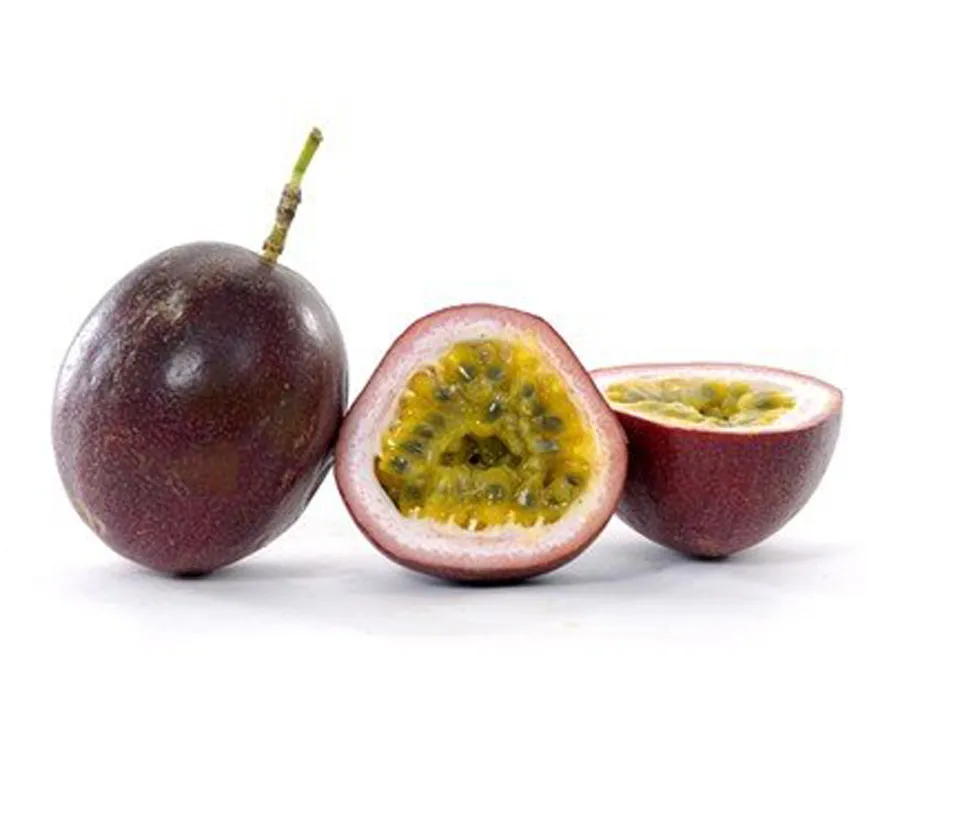source

Ancient tropical culture of the genus Passiflora, which gives oval fruits of yellow or dark purple (in mature form), which grow on the vines. Passion fruit is grown for its juice, which is often added to other fruit juices for flavor. The homeland of the passion fruit is Brazil, but it is currently grown in Australia, South America and South Africa. The passion fruit is a dark orange or dark purple fruit with an oval shape and a size of approximately 6 to 12 cm. Preferably, fruits with soft and shiny skin, but sweeter with rough and cracked skin.
The fruit can be simply cut in half and eat fragrant pulp. The seeds of the passion fruit are also very edible, they are used to decorate cakes and other confectionery products. The sweet and sour juice of the passion fruit is valuable for cooking, and because of its high tonic properties, it is also used in the pharmaceutical and cosmetic industry. When buying a passion fruit, you should choose large, wrinkled fruits with dark purple rind and sweet yellow-green seeds. The ripe fruit may be in the refrigerator for about a week.
The pulp of the fruit of the passion fruit contains up to 35-40% juice. The massive fraction of carbohydrates is in the range of 8.4% to 21.2%. The protein content in fruits is 2.2 * 3.0%, organic acids - 0.1-4.0%, mineral substances - 0.8-4.2%, fats - 0.4-0.7%. The passion fruit is rich in macro elements and trace elements such as iron, potassium, phosphorus, it also contains calcium, magnesium, sodium, sulfur, chlorine, iodine, manganese, copper, zinc and fluorine. The passion fruit contains vitamin C, E, B1, B2, B3, B5, B6, B9, A, H, K. The passion fruit improves intestinal function and has a slight laxative effect. In addition, these fruits stimulate the excretion of uric acid from the body and act as a natural febrifuge. The passion fruit is recommended for people suffering from diseases of the urinary tract and liver, as well as at reduced pressure.
The juice of this fruit has a calming effect and helps to improve sleep. The passion fruit contains alpha hydroxy acids. Improves hydration, elasticity and skin tone. It is used in cosmetics (gels) for discoloration of the skin with poor circulation, a tendency to pimples and oily skin with a poor self-cleaning. The passion fruit contains significant amounts of vitamins and minerals, rich in fiber and substances with antioxidant activity. Nutritionists recommend eating passion fruit for diseases of the cardiovascular system, liver, urinary tract and to lose weight. In addition, the passion fruit has antimicrobial, antipyretic and laxative effects, and also reduces the level of cholesterol in the blood, improves the digestive system and promotes the excretion of uric acid and other metabolic products.
The passion fruit has a beneficial effect on the liver and the urinary tract. Soluble fiber, which contains the fetus, reduces the level of cholesterol in the blood, reducing the risk of diseases of the cardiovascular system. Insoluble fiber normalizes the gastrointestinal tract and is used to prevent various diseases of the digestive system. The passion fruit also has anti-inflammatory action, protects the body from viral infections and regulates the nervous system. Passion fruit juice has a calming effect and improves sleep. Passion fruit juice has a tonic effect, has a calming effect on the body, helps to sleep and suppresses the growth of cancer cells, and also finds wide application in pharmaceuticals and cosmetology.
The seeds of the passion fruit are edible, but they have the effect of sleeping pills. The fetus contains pasiflorin glycoside, which guarantees its calming effect on the body. The sedative drugs are made of passion flower.
Individual intolerance to passion fruit and allergies to this exotic fruit occurs. It is recommended that lactating and pregnant women remember the measure and not eat it too much. The fruits of edible passionflower are contraindicated in young children, since their digestive system does not work well with this product.